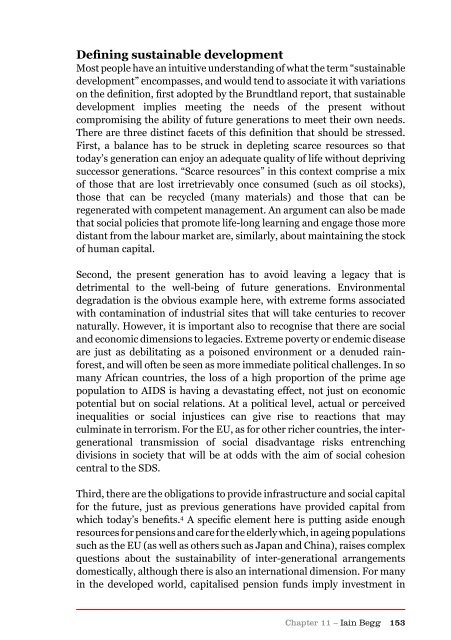Authors Iain Begg | Gabriel Glöckler | Anke Hassel ... - The Europaeum
Authors Iain Begg | Gabriel Glöckler | Anke Hassel ... - The Europaeum
Authors Iain Begg | Gabriel Glöckler | Anke Hassel ... - The Europaeum
You also want an ePaper? Increase the reach of your titles
YUMPU automatically turns print PDFs into web optimized ePapers that Google loves.
Defining sustainable development<br />
Most people have an intuitive understanding of what the term “sustainable<br />
development” encompasses, and would tend to associate it with variations<br />
on the definition, first adopted by the Brundtland report, that sustainable<br />
development implies meeting the needs of the present without<br />
compromising the ability of future generations to meet their own needs.<br />
<strong>The</strong>re are three distinct facets of this definition that should be stressed.<br />
First, a balance has to be struck in depleting scarce resources so that<br />
today’s generation can enjoy an adequate quality of life without depriving<br />
successor generations. “Scarce resources” in this context comprise a mix<br />
of those that are lost irretrievably once consumed (such as oil stocks),<br />
those that can be recycled (many materials) and those that can be<br />
regenerated with competent management. An argument can also be made<br />
that social policies that promote life-long learning and engage those more<br />
distant from the labour market are, similarly, about maintaining the stock<br />
of human capital.<br />
Second, the present generation has to avoid leaving a legacy that is<br />
detrimental to the well-being of future generations. Environmental<br />
degradation is the obvious example here, with extreme forms associated<br />
with contamination of industrial sites that will take centuries to recover<br />
naturally. However, it is important also to recognise that there are social<br />
and economic dimensions to legacies. Extreme poverty or endemic disease<br />
are just as debilitating as a poisoned environment or a denuded rainforest,<br />
and will often be seen as more immediate political challenges. In so<br />
many African countries, the loss of a high proportion of the prime age<br />
population to AIDS is having a devastating effect, not just on economic<br />
potential but on social relations. At a political level, actual or perceived<br />
inequalities or social injustices can give rise to reactions that may<br />
culminate in terrorism. For the EU, as for other richer countries, the intergenerational<br />
transmission of social disadvantage risks entrenching<br />
divisions in society that will be at odds with the aim of social cohesion<br />
central to the SDS.<br />
Third, there are the obligations to provide infrastructure and social capital<br />
for the future, just as previous generations have provided capital from<br />
which today’s benefits. 4 A specific element here is putting aside enough<br />
resources for pensions and care for the elderly which, in ageing populations<br />
such as the EU (as well as others such as Japan and China), raises complex<br />
questions about the sustainability of inter-generational arrangements<br />
domestically, although there is also an international dimension. For many<br />
in the developed world, capitalised pension funds imply investment in<br />
Chapter 11 – <strong>Iain</strong> <strong>Begg</strong> 153

















